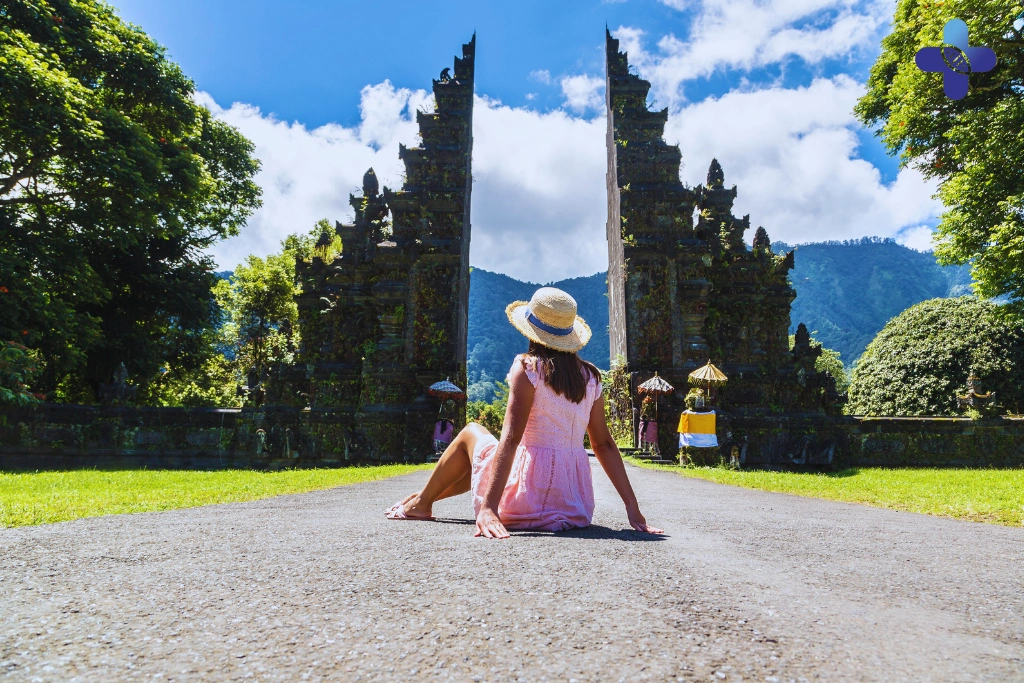Planning your first trip to Bali? With its lush landscapes, rich traditions, and warm hospitality, Bali promises an unforgettable adventure—but for first-timers, it can also feel overwhelming. From currency tips to temple etiquette and health essentials, this guide compiles 15 must-know insights to help you navigate the island like a pro. Whether you’re heading to Canggu, Ubud, or Seminyak, these first time in Bali tips will ensure your journey starts smooth, safe, and full of joy.
First Time in Bali? 15 Essential Tips for a Flawless First Trip (2025)

Bali is more than just a destination—it’s a sensory experience that blends natural beauty, deep spirituality, and warm hospitality. For first-time visitors, it’s easy to be swept away by the excitement and overlook the small details that make the journey smoother. That’s why having a reliable guide can make all the difference, from knowing how to use Gojek to understanding temple etiquette or finding a nearby Medical Clinic in Bali when you need it most.
At Life Everyouth Bali, we’re here not just for emergencies, but as a supportive companion throughout your trip. Whether you’re recovering from jet lag, seeking hydration, or simply looking for trusted advice, our team is ready to welcome you. We hope this guide empowers you to explore confidently, stay healthy, and embrace the magic of the island. Your unforgettable Bali adventure starts here—with knowledge, respect, and care from Life Everyouth, your go-to Bali Medical Clinic.
The Practical Stuff: Money, SIM Cards & Transport
Tip 1: Money Matters
Indonesia uses the Rupiah (IDR) as its official currency, and cash is still king in many parts of Bali. While credit cards are accepted at hotels, high-end restaurants, and supermarkets, smaller vendors and warungs often only take cash. ATMs are widely available, especially in tourist areas, but stick to machines at reputable banks like BCA, Mandiri, or BNI to avoid scams or skimming risks. If you plan to exchange currency, choose authorized money changers—those with glass counters, official signage, and digital boards.
Always count your money before leaving, and avoid changing large sums at once. It’s also good to keep small denominations (like 10,000–50,000 IDR) for taxis, snacks, and temple donations. If you ever find yourself in an unfamiliar area or need assistance due to dizziness or sudden illness while withdrawing money, Life Everyouth Bali, a nearby Medical Clinic in Bali, is ready to support you—our clinics are conveniently located near many central hubs and banks.
Tip 2: Stay Connected
Staying online in Bali is not just about Instagram—it’s about navigation, translation, payments, and safety. Getting a local SIM card is one of the first things you should do upon arrival. You can find SIM card kiosks at Ngurah Rai International Airport, or buy one from major providers like Telkomsel, XL Axiata, or Smartfren at local convenience stores or phone shops. Most tourist-friendly SIMs come with large data packages and cost around IDR 100,000–150,000 ($6–10 USD).
Make sure your phone is unlocked and ask for assistance setting it up if you’re unsure. With local data, you can instantly locate pharmacies, restaurants, or the nearest Medical Clinic Bali like Life Everyouth, especially in urgent moments. Many travelers rely on Google Maps or WhatsApp to contact clinics or access teleconsultation services, so don’t underestimate the value of staying connected.
Tip 3: Get Around with Ride-Hailing Apps
Transportation in Bali can be both adventurous and confusing, especially during your first visit. Ride-hailing apps like Gojek and Grab are a lifesaver—offering affordable, trackable, and cashless rides across most tourist areas. These apps are safer than haggling with street taxis and provide real-time fare estimates, ratings, and even motorbike options for faster travel. Prices are low, with short rides often costing under IDR 30,000 (around $2 USD).
However, be aware that some areas—especially around hotels or temples—might restrict app-based pickups. In such cases, walk a short distance to find a pickup spot or ask hotel staff for help. If you’re not feeling well and need to visit Life Everyouth, a reliable Bali Medical Clinic, these apps will get you to the nearest branch quickly, whether you’re in Ubud, Canggu, or Seminyak. They also offer delivery services if you’re recovering and prefer to stay in.
The Cultural Stuff: Respect is Key
Tip 4: Dress Appropriately for Temples
Temples are central to Balinese life—more than just picturesque photo spots, they are sacred places of daily prayer and ceremony. When visiting, it’s customary (and sometimes mandatory) to wear a sarong wrapped around the waist and a selendang (sash) tied around the hips, regardless of gender. These can be rented or borrowed at most large temples, or purchased cheaply in markets around Ubud and Seminyak. Shoulders and knees must be covered as a sign of respect, even in hot weather.
Wearing proper attire not only shows humility but also enhances your connection with Balinese spirituality. At Life Everyouth, a culturally aware Medical Clinic Bali, we often guide first-time visitors on local customs—especially those who feel unwell during ceremonies or temple tours. Showing respect through clothing is a small gesture that leaves a lasting impression on locals.
Tip 5: Watch Your Step
One of the most beautiful elements of Balinese culture is the Canang Sari—a daily offering made of flowers, incense, and palm leaves placed on sidewalks, stairs, and temple entrances. These offerings are made fresh each morning to honor spirits and bring balance between the human and divine. Tourists often unknowingly step on them, especially when distracted or rushing through crowded streets.
Avoiding these offerings shows cultural sensitivity. Locals understand it might be accidental, but taking the time to step around them demonstrates awareness. If you accidentally trip or twist an ankle while walking in narrow alleys or temple stairs, you can always seek help at Life Everyouth Bali, a compassionate Medical Clinic in Bali that’s familiar with the needs of visiting travelers.
Tip 6: Use Your Right Hand
In Balinese and wider Indonesian etiquette, the right hand is used for most public interactions—whether handing over money, giving something to someone, or greeting others. The left hand is considered less clean, traditionally reserved for private hygiene. While you won’t be scolded for forgetting, using your right hand in shops, ceremonies, or even when paying a taxi fare is a simple way to show respect.
This practice may feel unfamiliar at first but quickly becomes second nature. When visiting a Bali Medical Clinic like Life Everyouth, you may also notice staff handing you medications or documents with their right hand—part of our effort to align with local customs while making international guests feel at home.
The Health & Safety Stuff: Stay Well & Secure

Tip 7: Don’t Drink the Tap Water
One of the quickest ways to ruin your Bali holiday is by drinking unfiltered tap water. Bali’s tap water is not treated to the standards many travelers are used to, and consuming it can lead to gastrointestinal issues, including the dreaded “Bali Belly.” Use bottled or filtered water for drinking, brushing teeth, and even rinsing your mouth if you have a sensitive stomach. Most accommodations provide refilled water stations—carry a reusable bottle to stay eco-friendly.
At Life Everyouth, a trusted Medical Clinic Bali, we treat many first-timers who unknowingly brushed their teeth or made ice with tap water. For peace of mind, you can stop by for hydration support or an IV therapy if symptoms arise. (Link to internal article: “Can You Drink Tap Water in Bali?”)
Tip 8: Be Smart About Scooters
Scooters are everywhere in Bali—and they can be fun and convenient. But for beginners, they’re also risky. The roads are narrow, traffic can be chaotic, and local driving norms are different. Always wear a helmet, drive slowly, and only rent if you’re confident in your ability to handle a two-wheeler.
Travel insurance often excludes motorbike accidents unless you hold a valid motorcycle license. We’ve treated countless cases of scrapes, sprains, and more serious injuries at Life Everyouth Bali, your accessible Medical Clinic in Bali, especially in areas like Canggu and Uluwatu. (Link to internal article: “Renting a Scooter in Bali? 10 Safety Rules…”)
Tip 9: Get Good Travel Insurance
It’s easy to overlook travel insurance—until you need it. From food poisoning to flight delays and motorbike injuries, things can go wrong when you least expect them. Choose a policy that covers medical treatment, evacuation, theft, and transport accidents, and make sure your activities (like diving or scooter riding) are included.
Life Everyouth, a reputable Bali Medical Clinic, works with major international insurance providers and can provide receipts or medical documentation for claims. We’ve supported countless travelers in handling unexpected issues smoothly—because nothing is more reassuring than knowing you’re covered. (Link to internal article: “The Ultimate Bali Health & Safety Guide”)
The Pro Traveller Hack: Start Your Holiday Strong, Not Stressed

Tip 10: Don’t Let Jet Lag Win
After a long-haul flight, your body clock is completely out of sync—especially if you’re coming from Europe or the US. Jet lag in Bali often results in a wasted first day: you’re tired, dehydrated, mentally foggy, and more likely to get sick. Some try to push through with coffee or naps, but it only prolongs the adjustment. Instead, prepare to land strong by planning a gentle Day 1 and taking care of your body the moment you arrive.
That’s why many frequent travelers visit Life Everyouth, a leading Medical Clinic in Bali, right after landing. A short stop for IV therapy can help reset your system and rescue your energy before the island adventure begins.
Tip 11: Boost Your Immune System on Arrival
Airports, airplanes, and jet lag can weaken your immune system, leaving you vulnerable to illness during the first few days of your trip. Even if you’re excited to explore, your body might be depleted from stress, poor sleep, and low nutrition. A quick immune boost on arrival helps your body fight off common travel bugs and gives you a head start in adjusting to the tropical environment.
At Life Everyouth Bali, we provide arrival-focused IV Drip formulas with essential vitamins, antioxidants, and fluids that support immune resilience. As a fully equipped Bali Medical Clinic, we’ve helped travelers start their holidays stronger, healthier, and more energized—often in under an hour.
Tip 12: Hydrate Like a Champion
Dehydration is one of the most common health complaints among new arrivals. Bali’s heat and humidity are intense, and sweating begins the moment you step off the plane. Combine that with flight dehydration, sun exposure, and alcohol, and you have a recipe for dizziness, headaches, or heat exhaustion by Day 2.
To recover quickly, many travelers book an Arrival Recovery IV Drip at Life Everyouth, the go-to Medical Clinic in Bali for modern wellness care. This fast and effective treatment restores fluids, replenishes electrolytes, and clears out fatigue—leaving you refreshed and ready to make the most of your trip. Learn more about the benefits of IV Drip Therapy in Bali and why it’s become a favorite recovery hack for experienced travelers.
The Fun Stuff: Making the Most of It
Tip 13: Learn a Few Indonesian Words
Even though English is widely spoken in Bali, knowing a few simple Bahasa Indonesia phrases will go a long way. Words like “Terima kasih” (thank you), “Permisi” (excuse me), and “Apa kabar?” (how are you?) can spark smiles and help you connect on a more human level. It’s not about fluency—it’s about effort and respect. Locals will appreciate that you’re not just a tourist, but someone willing to embrace the island’s culture.
At Life Everyouth, we encourage this kind of connection. Even in our Medical Clinic Bali setting, a few Indonesian words often ease tension and foster warmth between travelers and staff.
Tip 14: Explore Beyond the Main Hubs
It’s easy to fall in love with places like Seminyak, Canggu, or Ubud—but there’s more to Bali than its most popular spots. Venture out to Sidemen’s emerald rice terraces, snorkel in Amed’s calm waters, or hike the waterfalls near Munduk. These lesser-known regions offer peace, beauty, and authentic moments far from the crowds.
As you explore, remember that Life Everyouth Bali, your trusted Bali Medical Clinic, has branches in central areas should you need quick access to care. And if you’re venturing far, bring essentials like repellent, a basic first-aid kit, and a screenshot of emergency clinic contact info—just in case.
Tip 15: Embrace “Jam Karet” (Elastic Time)
Bali runs on its own rhythm, lovingly referred to as “Jam Karet”—meaning elastic time. Things may start a bit late, events might shift, and traffic may surprise you. Rather than fight it, lean into the slower pace. It’s not inefficiency—it’s island life.
At Life Everyouth, even though we’re a punctual Medical Clinic in Bali, we understand that part of healing and enjoying Bali comes from slowing down. Let go of strict schedules, and allow space for the unexpected—that’s often where the magic lives.
Conclusion First Time in Bali? 15 Essential Tips for Beginners (2025)

Your first trip to Bali is more than just a vacation—it’s a cultural experience, a wellness reset, and a journey of discovery. With these first time in Bali tips, you’re now equipped to explore the island confidently, respectfully, and safely.
At Life Everyouth, we’re more than just a Medical Clinic Bali—we’re your wellness partner on the island. Whether you’re navigating cultural nuances, staying healthy, or recharging with an IV Drip, we’re here to help make your stay extraordinary.
So pack light, stay curious, and embrace everything Bali has to offer. From its breathtaking temples to warm hospitality, your adventure starts now. And if you ever need trusted medical care, Life Everyouth Bali is only a call away—your reliable Bali Medical Clinic wherever your journey takes you.
Frequently Asked Question First Time in Bali? 15 Essential Tips for Beginners (2025)
Do I need a visa for Bali in 2025?
Yes, most travelers can enter Bali with a Visa on Arrival (VoA), which is valid for 30 days and extendable once. This applies to over 80 nationalities, including from Europe, Australia, and the US. However, regulations may change, so always confirm with official sources before flying. If you’re unsure or experience health issues during your visa extension, Life Everyouth Bali—a trusted Medical Clinic Bali—can assist with medical documentation if needed.
What is the best currency to bring to Bali?
The official currency is Indonesian Rupiah (IDR), and it’s best to bring clean, undamaged bills in your home currency to exchange. Authorized money changers offer fair rates, but ATMs from major banks are often more convenient. Avoid exchanging money at hotels or airport counters with poor rates. Life Everyouth, your nearby Medical Clinic in Bali, is often located close to safe banking and exchange zones if you need help during clinic visits.
Is Bali expensive for a first-time visitor?
Bali can be as affordable or luxurious as you choose. Local warungs offer tasty meals for $2–$4, while upscale beach clubs can cost ten times more. Accommodation ranges from budget hostels to five-star resorts. Even when seeking care at Life Everyouth Bali, a reliable Bali Medical Clinic, you’ll find transparent pricing tailored to travelers.
Which area is best to stay in for a first-timer?
Seminyak is great for boutique shopping and sunsets, Canggu is trendy and ideal for café culture and surfing, while Ubud offers spiritual calm and natural beauty. Each area offers something unique depending on your vibe. All three have easy access to transport, food, and health services. Wherever you stay, Life Everyouth, a trusted Medical Clinic in Bali, is within reach for peace of mind.
Is English widely spoken in Bali?
Yes, English is commonly spoken in hotels, restaurants, clinics, and tourist areas across Bali. While fluency varies, most locals working in tourism understand basic English well. Learning simple phrases like “Terima kasih” (thank you) still goes a long way. At Life Everyouth Bali, all staff at our Medical Clinic Bali locations are English-speaking to support international guests.
What is the best time of year to visit Bali?
The dry season from April to October is ideal—expect sunny days, lower humidity, and minimal rain. The wet season (November to March) brings lush landscapes and fewer crowds, but also short afternoon showers. Each season has its charm depending on your travel goals. No matter when you visit, Life Everyouth, a year-round Bali Medical Clinic, is ready to support your health.
Do I need to bargain when shopping?
In traditional markets and small stalls, bargaining is expected and even encouraged. Start with a smile, offer half the initial price, and negotiate politely. In supermarkets, convenience stores, and restaurants, prices are fixed. If you need assistance with local customs or feel unwell during your shopping trips, drop by Life Everyouth Bali, your nearby Medical Clinic in Bali.
Are Gojek and Grab available everywhere in Bali?
Yes, Gojek and Grab are widely available in Ubud, Seminyak, Canggu, and other tourist hotspots. In remote areas like Sidemen or Nusa Penida, access is limited, so it’s best to prearrange transport. These apps are reliable for getting around safely—especially to reach a Bali Medical Clinic like Life Everyouth. They also offer food delivery and cashless payments for convenience.
What kind of clothes should I pack for Bali?
Pack light, breathable clothing such as cotton or linen, plus swimwear, sandals, and a sarong for temple visits. Sunscreen and a hat are essential due to intense tropical sun. Bring a light jacket for cooler nights in Ubud or highland areas. If sun exposure leads to dehydration or rash, you can always stop by Life Everyouth Bali, your local Medical Clinic Bali, for fast care.
Is Bali safe for solo female travellers?
Yes, Bali is considered one of the safest destinations in Southeast Asia for women traveling alone. Most locals are friendly and respectful, but general safety practices still apply. Avoid walking alone late at night in quiet alleys and always keep your valuables secure. Life Everyouth, a caring and responsive Medical Clinic in Bali, welcomes solo travelers who may need medical support or just a safe space to rest.
